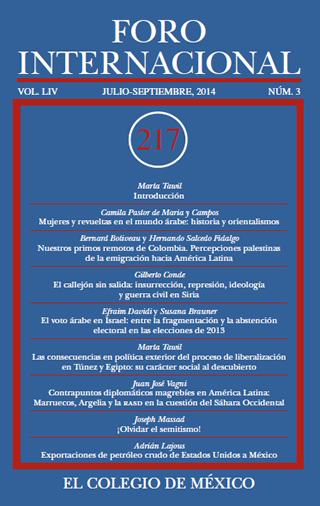Most read articles by the same author(s)
- Erika Alitzel Verspecht , Marta Tawil, Populism and foreign Policy: India towards Israel , Foro Internacional: Vol. LXII, 2 (248) april - june, 2022
- Marta Tawil, El cambio internacional desde las relaciones Sur-Sur. Los lazos de Brasil, Chile y Venezuela con los países en desarrollo de África, Asia y el Medio Oriente , Foro Internacional: Vol. LIX, 2 (236) april - june, 2019
- Marta Tawil, Introducción , Foro Internacional: Vol. LIV, 3 (217) july - september, 2014













